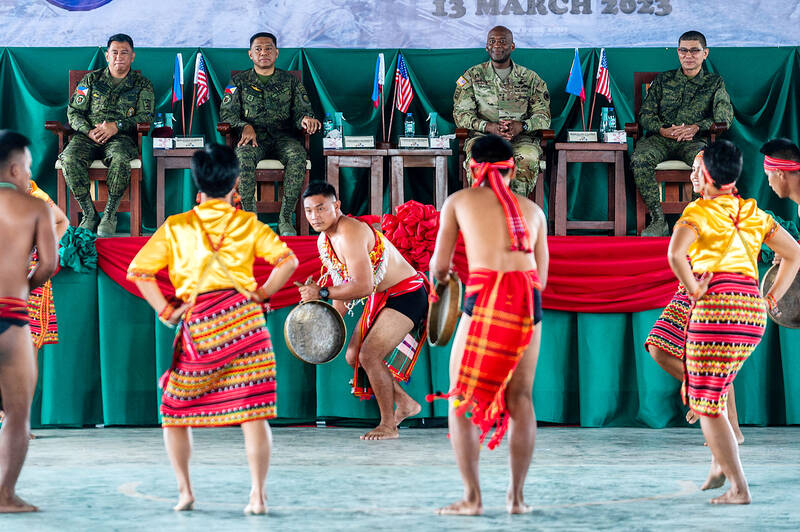China on Sunday hit back at the US for expanding military access in the Philippines, saying that Washington was trying to “encircle and contain” Beijing, and is “driving a wedge” between the two Asian nations.
The Chinese embassy said the US was moving to “secure its hegemony and selfish geopolitical interests.”
Involving the Philippines “will seriously harm” the nation’s interest and endanger regional peace and stability, the embassy said in a statement responding to a recent interview with the US ambassador in Manila.

Photo: Reuters
The Philippines last month gave the US access to four more military bases under the countries’ Enhanced Defense Cooperation Agreement, with some of the sites believed to be in provinces near Taiwan. The 2014 pact allows the US to rotate its troops for prolonged stays as well as build and operate facilities on Philippine bases.
“The US military has been coming all the way from the other side of the Pacific to stir up trouble in the South China Sea and ganging up with its allies from other parts of the world to flex muscle,” the Chinese statement said. “By doing these, the US has not only heightened tension, driven wedge between China and Philippines, but has also disturbed and upset the joint effort of countries in this region to safeguard peace and stability in the South China Sea.”
Manila under Philippine President Ferdinand Marcos Jr has been ramping up the rhetoric against Beijing on a territorial dispute. At the same time, it plans to restart patrols with the US in disputed waters and expand military exercises with US troops.
Marcos’ administration has filed at least 77 diplomatic protests against China over “alleged” contraventions in the South China Sea since it started in June last year. That was almost one-fifth of the 388 filings made by his predecessor, former Philippine president Rodrigo Duterte, who pivoted the Philippines’ foreign policy toward China during his six-year tenure.
“Now that China and the Philippines, among other countries of the region, are at a critical juncture of post-COVID recovery, we should keep to the right track of maintaining good-neighborliness and attaining mutual benefit rather than getting distracted by forces who are fanning the flame and driving a wedge between us,” China’s statement said.
The US has said its so-called “freedom of navigation operations” follow international law.
The Chinese embassy statement echoed Chinese President Xi Jinping’s (習近平) remarks last week, where he said Beijing is grappling with “comprehensive containment and suppression by Western countries led by the US.”
Chinese Minister of Foreign Affairs Qin Gang (秦剛) has also warned of moves to “contain and suppress China in all respects.”

DIALOGUE: US president-elect Donald Trump on his Truth Social platform confirmed that he had spoken with Xi, saying ‘the call was a very good one’ for the US and China US president-elect Donald Trump and Chinese President Xi Jinping (習近平) discussed Taiwan, trade, fentanyl and TikTok in a phone call on Friday, just days before Trump heads back to the White House with vows to impose tariffs and other measures on the US’ biggest rival. Despite that, Xi congratulated Trump on his second term and pushed for improved ties, the Chinese Ministry of Foreign Affairs said. The call came the same day that the US Supreme Court backed a law banning TikTok unless it is sold by its China-based parent company. “We both attach great importance to interaction, hope for

RISING TENSIONS: The nations’ three leaders discussed China’s ‘dangerous and unlawful behavior in the South China Sea,’ and agreed on the importance of continued coordination Japan, the Philippines and the US vowed to further deepen cooperation under a trilateral arrangement in the face of rising tensions in Asia’s waters, the three nations said following a call among their leaders. Japanese Prime Minister Shigeru Ishiba, Philippine President Ferdinand Marcos Jr and outgoing US President Joe Biden met via videoconference on Monday morning. Marcos’ communications office said the leaders “agreed to enhance and deepen economic, maritime and technology cooperation.” The call followed a first-of-its-kind summit meeting of Marcos, Biden and then-Japanese prime minister Fumio Kishida in Washington in April last year that led to a vow to uphold international

US president-elect Donald Trump is not typically known for his calm or reserve, but in a craftsman’s workshop in rural China he sits in divine contemplation. Cross-legged with his eyes half-closed in a pose evoking the Buddha, this porcelain version of the divisive US leader-in-waiting is the work of designer and sculptor Hong Jinshi (洪金世). The Zen-like figures — which Hong sells for between 999 and 20,000 yuan (US$136 to US$2,728) depending on their size — first went viral in 2021 on the e-commerce platform Taobao, attracting national headlines. Ahead of the real-estate magnate’s inauguration for a second term on Monday next week,

CYBERSCAM: Anne, an interior decorator with mental health problems, spent a year and a half believing she was communicating with Brad Pitt and lost US$855,259 A French woman who revealed on TV how she had lost her life savings to scammers posing as Brad Pitt has faced a wave of online harassment and mockery, leading the interview to be withdrawn on Tuesday. The woman, named as Anne, told the Seven to Eight program on the TF1 channel how she had believed she was in a romantic relationship with the Hollywood star, leading her to divorce her husband and transfer 830,000 euros (US$855,259). The scammers used fake social media and WhatsApp accounts, as well as artificial intelligence image-creating technology to send Anne selfies and other messages